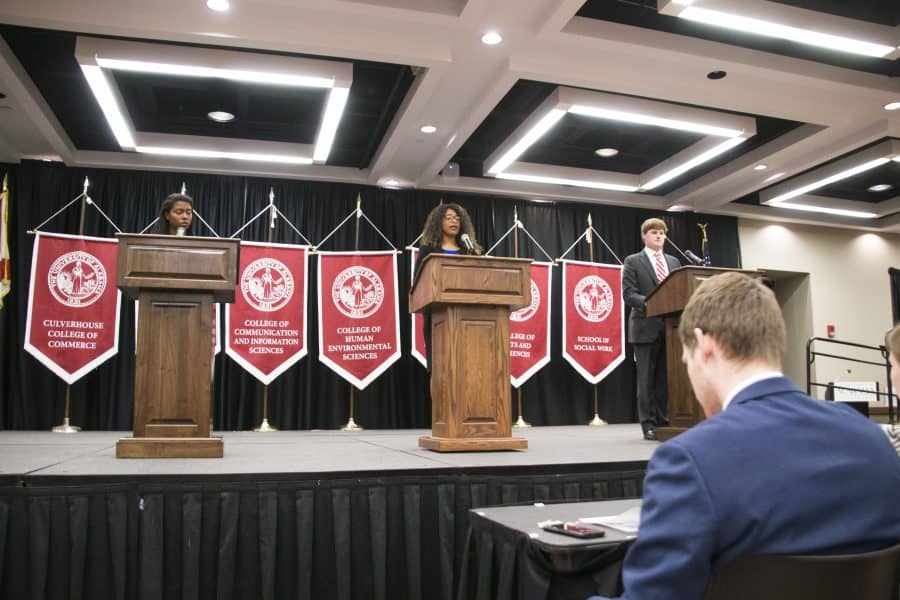During the 2018 SGA presidential debate each candidate stood before 300 of their peers with only 48 hours to go before polls close and discussed campus-wide issues like SGA ethics and sexual assault.
Each candidate’s opening statement highlighted initiatives that the candidate would pursue if elected to the presidency.
Scales opened by emphasizing that resources must be available to all members of the diverse student body. She said the Capstone Creed and Student Code of Conduct must reflect one another.
Navarro described her platform to the audience through three initiatives consisting of student health and wellbeing, access to financial resources, and diversity, equity and inclusion before running out of time.
McGiffert started off by establishing his experience with ways he was worked to benefit students before citing issues that he wishes to work on such as providing transportation for students via Uber and Lyft and allowing vendors to walk through the student section. McGiffert ended his opening statement refusing “to make promises that I cannot deliver.”
Following the opening statements, the moderators took over questioning, beginning with the ethics of the SGA.
Scales said the underrepresentation of campus in the SGA contributes to its inefficiencies and also used the question to target the SGA website’s lack of transparency.
“You shouldn’t have to have a friend on the inside to know the legislation that is being passed by senators,” she said.
Navarro said the University’s history hinders the SGA’s progress. She said diversity within the SGA and conversations about religion, veterans and sexual orientation are necessary to improve campus.
“It’s important to speak about injustice that SGA has done in their past,” she said.
McGiffert also focused heavily on overall transparency, assuring the student body that, if elected, his office hours would be posted every Sunday night. Additionally, McGiffert said his email would be available for all to see throughout the entirety of his administration, and that he would be present for the first five minutes of all Senate meetings to answer any questions.
The moderators then changed the issue at hand to sexual assault, and each candidate advocated for institutional change.
Scales said the issue has become a national conversation and that the University has the opportunity to “be at the forefront of change.” Additionally, Scales pushed for the institution of bystander training and alcohol and substance abuse training, especially in regards to consent.
Navarro said “It’s On Us” week should be retooled into “Its On Us” month because of the importance of the issue. Navarro also offered to extend Harbor training to all students if she becomes SGA president.
McGiffert also advocated that the issue be examined for longer than one week while simultaneously advocating to “turn Tuscaloosa teal” for a month in order to raise funds and awareness about the issue. Additionally, McGiffert’s platform concerning bystander training aligned with Scales’.
In the event of a run-off, Navarro said she’d vote for Scales and Scales and McGiffert said they’d vote for Navarro.
After the debate Amanda White, a senior majoring in management information systems, said Scales won the debate based off her ability to answer clearly and knowledgeably.
“She gave answers that were meaningful, in-depth and were very specific to the question asked,” White said. “Amber had [her platform] memorized flawlessly showing she’d be prepared to really create that sustainable change.”
Contrarily, Resha Swanson, a junior majoring in social work and Spanish, said Marissa Navarro won the debate.
“She spoke not just about the initiatives that she planned to do, but she had actual actions to back it up,” Swanson said. “She’s passed numerous initiatives as well as legislation in front of Senate.”








